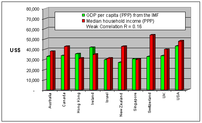This is an intersting read. What could this bracket be for the Philippines?? Can we even make a similar graph from data BIR has? NSO ?
Sometimes wish a day has 2400 hours.(not too often)
That said, there is an interesting qualitative change in the structure of income that starts to happen around this cutoff for the “rich” which actually suggests that taxpayers above that threshold are rich in most important ways. The most recent (2007) tax stats from the IRS now reflect the peak of the late bubble and show that the $100K-$200K AGI bucket is the last one that more-or-less resembles middle-income categories in their dependence on labor as the all-but exclusive source of income. (Think of pensions and proceeds of retirement accounts as representing deferred wages or salaries.) This graph shows the shares of AGI from some major income sources, and the average incomes for various brackets. (*)
Sources of Individual Income, 2007 SOI Tax Stats
(May be embiggened by clicking here.)
Starting with the $200-500K category, the share of earnings from labor begins a marked decline. By the time you hit mid-six figures, average earnings from income, dividends, and capital gains become high enough to provide middle-class or better incomes without (necessarily) working. Tax returns in the upper-six-figure bucket, on average, show more income from other sources collectively than from salaries, and at the top of the income scale even interest and dividend income exceeds wages and salaries. (**) I suggest that if you can provide yourself with a better-than-average living without working, a very rare luxury indeed, you are in fact rich.
(Revised and slightly expanded.)
via The Rich *Are* Different | Angry Bear.

![Reblog this post [with Zemanta]](https://i0.wp.com/img.zemanta.com/reblog_e.png?w=525)
